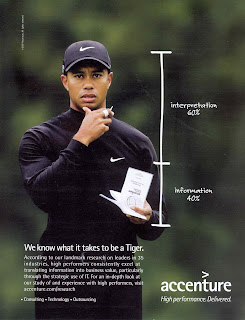Dilemma #1I sat down with a cup of coffee to clear out my e-mail this morning. I thought I'd give it about 15 minutes, then go and do something else. Well, I deleted one e-mail at a glance, and moved on to read the next one. There was a phrase in this one that I particularly liked, but it was only referred to as 'someone once said ...' So I Googled the phrase to try to find the original source and context. This story continues under Dilemma #2 below.
The point here is that a 15 minute e-mail clear out has resulted in one deleted e-mail, and more than 20 minutes so far pursuing a tangential thought, ultimately resulting in this blog. So how do you stop the Internet in all its guises from consuming too much time?
Dilemma #2
This is the real thrust of this blog entry. Having Googled the phrase, I came up with only 2 results. One was from the document that I had been reading. The other was from a blog, which I then had a look at. Worringly, the entry relating to the phrase that I was hunting was exactly the same as the e-mail that I had received. I mean, word for word copying - but without any acknowledgement of the source. The blog author has a different name from the e-mail author. They were both published on the same day - yesterday.
So what to do? First of all let me say that one of my pet hates is plagiarism. I'm all for using other people's material, and quoting it verbatim - but acknowledge the source, or at least indicate that it's not your original material. Aye, I know there will have been times when I've fallen short of this standard - but not the the extent of a whole blog entry!
In the preface to his book 10, J John writes:
"There are lots of quotes in this book and where I can I have tried to give due credit to their authors. The eighth commandment applies to words as well as things... For the unconscious use - or abuse - of any such material, I ask forgiveness."
Should I enter into an e-mail dialogue with either party or both, or should I let it go?
There is a discipline involved in getting this kind of thing right, but surely it's not too onerous. Of course, beyond the lazy/careless excuse there are other explanations, but I'll leave that to the consciences of the individuals concerned.
I once came across a situation where a whole series of presentations had been pinched from the Internet and only changed where there were specific cultural references that wouldn't have worked. I ignored this at the time, as it didn't seem to be worth picking a fight over. I now regret that decision.
Thoughts would be appreciated.
 So I’m finally reacting to the Tiger Woods story. I remember being intrigued by some of the adverts that Accenture produced (before they dumped him). I particularly liked those that were in the ‘split percentage’ format. I admire (present continuous) Tiger’s prowess as a golfer; his dedication to practice and fitness; his ability to remain calm amidst the tumult of the crowd (mostly); his charming way of dealing with fans and media alike.
So I’m finally reacting to the Tiger Woods story. I remember being intrigued by some of the adverts that Accenture produced (before they dumped him). I particularly liked those that were in the ‘split percentage’ format. I admire (present continuous) Tiger’s prowess as a golfer; his dedication to practice and fitness; his ability to remain calm amidst the tumult of the crowd (mostly); his charming way of dealing with fans and media alike.




